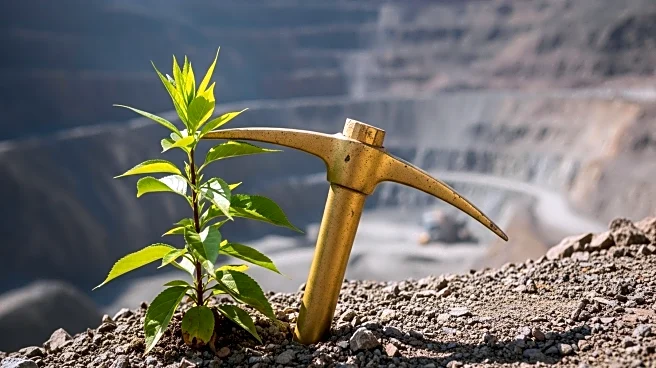What's Happening?
Peru is currently debating significant reforms to its mining concession system, which is crucial to its status as a major global producer of copper and gold. The proposed changes aim to address the long-standing issues of idle concessions and illegal mining activities. The reforms could shorten concession periods from decades to as little as 10 years and introduce 'use-it-or-lose-it' provisions to revoke underutilized concessions. This has raised concerns among large mining companies about the security of their investments, as these companies rely on long-term concessions to justify their substantial financial commitments. The debate is further complicated by the rise of illegal mining, which has led to significant economic and environmental challenges.
Why It's Important?
The outcome of Peru's mining concession reform could have far-reaching implications for the global mining industry, particularly in the context of the energy transition that relies heavily on critical minerals. Large mining companies fear that the proposed changes could undermine investment security, potentially redirecting billions of dollars to other jurisdictions. This could impact Peru's economy, where mining represents a significant portion of GDP and exports. Additionally, the reforms are seen as a response to social pressures from small-scale miners and local communities seeking greater access to mineral resources. The balance between large-scale and small-scale mining interests will be crucial in determining the future of Peru's mining sector.
What's Next?
As the Peruvian Congress continues to debate the proposed reforms, the outcome remains uncertain. The government has yet to take a definitive stance, and the issue is expected to be a significant topic in the upcoming presidential and legislative elections. Mining companies are actively lobbying to protect their interests, while local communities and small-scale miners are organizing to influence the process. The resolution of this debate will be critical in shaping Peru's ability to attract international mining investment and capitalize on the growing demand for minerals essential for the energy transition.
Beyond the Headlines
The reform debate highlights broader issues of social and environmental governance in the mining sector. The rise of illegal mining has not only economic but also significant environmental and social implications, including mercury contamination and deforestation. The reforms could also set a precedent for other countries facing similar challenges, influencing global mining policies and practices.









